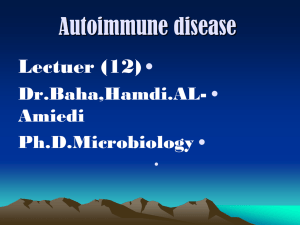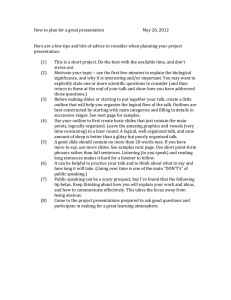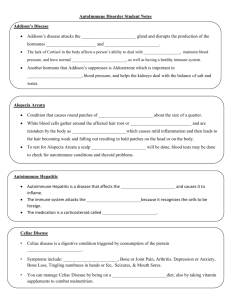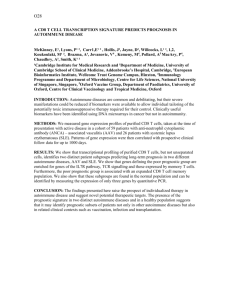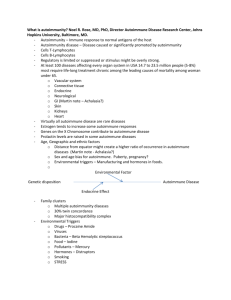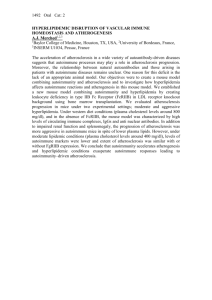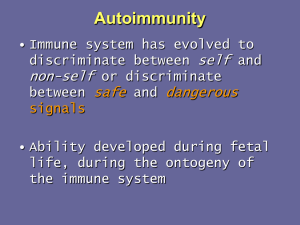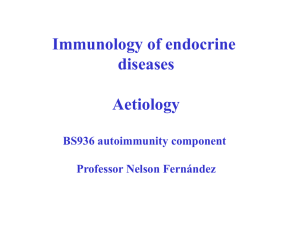. Autoimmune disease , Dr. Baha,Hamdi.AL-Amiedi
advertisement
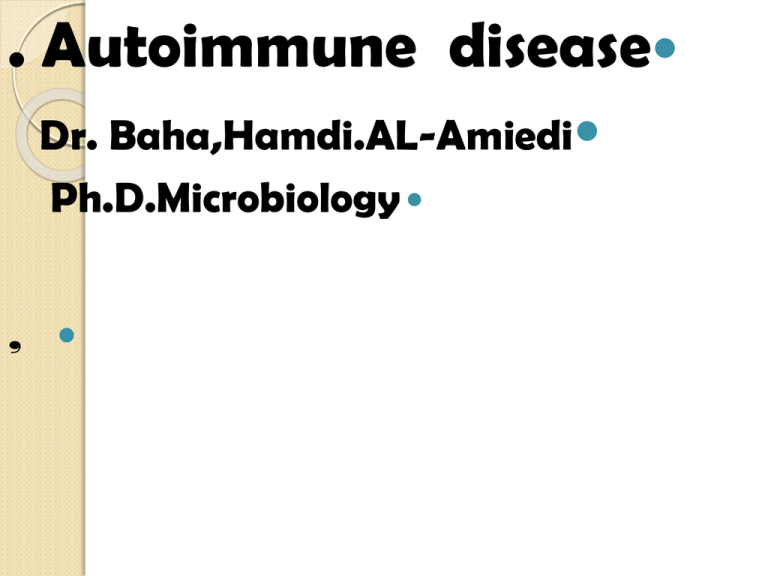
. Autoimmune disease Dr. Baha,Hamdi.AL-Amiedi Ph.D.Microbiology , Paul Ehrich The term coined by the German immunologist paul Ehrich ( 18541915) To describe the bodys innate aversion to immunological self - destraction Autoimmune disese Autoimmunity : Normally the immune system known its own tissues as self and does not react to them . Rarely, however there is a breakdown in this recognition and the immune system destroy its own tissue a phenomena termed autoimmunity As specificity repertoires that are expressed by both T- and B-Cells are random . it is no surprising that antiself specificites occur , there are mechanism which kill these self reactive cell , as described earlier , but some escape this surveillance , some autoimmune disease are triggered by microbial antigen which mimic or cross – react with self components. Causes of Autoimmunity Autoimmune diseases is a group of disorders in • which tissue injury is caused by humoral (by autoantibodies) or cell mediated immune response (by auto-reactive T cells) to self antigens. -An autoimmune disorder may result in: 1-The destruction of one or more types of body ◦ tissue 2-Abnormal growth of an organ ◦ 3-Changes in organ function Causes of Autoimmunity Autoimmune disease: An autoimmune disorder is a condition that occurs when the immune system attacks and destroys healthy body tissue. Classification of autoimmune disease: The organ specific when the specific pathology is confined to particular organ : (eg:Hashimotos disease , pernicious anaemia , Addisons disease ) And when the pathology is not confined to particular organ the disorder were placed under the head non-organ specific . systemic lupus erythrematosis, reheumatoid arithritis, dermatomyositis Moreover autoimmune disorder may overlap that mean a patient have more than one organ-specific disease & more than one systemic disease Based on the clinical experimental studies it has been suggested that autoimmunity may arise due to an immunologic imbalance with excessive B- cell activity &diminished suppressor T-cell activity. This imbalance may occur as a consequence of genetic , viral and environmental mechanisms acting singly or combination . Causes of Autoimmunity Organ specific autoimmune diseases A particular organ is affected due to auto Abs. For example: 1-Thyroiditis 2-Multiple sclerosis 3-Myasthenia gravis 4-Type I Diabetes Mellitus 5-Perinocous anaemia 6-Addisons disease 7-Hashimotos disease 8-Graves’ Disease Multiple Sclerosis Degeneration of nerves CNS (brain and spinal cord). Myelin disappear due inflammation. Graves’ Disease… This causes the stimulation of Thyroid gland to secrete more TH (Hyperthyroidism) resulting in Exophthalmus , bulging eyes & Goitre. Davidson’s book . non-specific autoimmune disease Immune complexes accumulate in many tissues and cause inflammation and Affects many organs or the whole body 1-Systemic lupus erythematosus 2-polymyositis 3-primary sjogrens syndrome 4-dermatomyositis 5-scierodema 6-Rheumatoid arthritis 7-Rheumatic fever Rheumatoid Arthritis Disease of the joints. Caused by the auto Antibody of IgM type, called as rheumatoid factors. The synovial fluid of these patients contain increased no. of T-cells & macrophages. Marked by inflammatory changes in the synovial membrane. In later stage, deformity develops. Condition of Rheumatoid Artheritis Systemic Lupus Erythematosus (SLE) Skin disease due to the production of antinuclear factor (ANF) symptoms include butterfly –rach on face, fatigue, headaches . In these patients, LE cell (a mature neutrophil) appears in blood & bone marrow Function – Phagocytosis in the presence of ANF ◦ strikes women nines more often than men ◦ Complex of anti-self antibodies & Antigen deposit in and cause damage to Renal tissue (glomeulonephritis) Triggered by environmental effects in persons who are genetically susceptible. Damaged kidney (left) caused by immunoglobulin deposits (right) Diagnosis autoimmune disease: General signs of autoimmune disease that may have diagnostic value include : 1-Elvated serum gamma globuline 2-presence of autoantibodies 3-Depress levels of serum complement 4-lmmune complex in serum 5-lesion detected on biopsy (e.glomerular lesions) resulting from deposition of immune complexs. Treatment: -The goals of treatment are to: 1-Reduce symptoms 2-Control the autoimmune process 3-Maintain the body's ability to fight disease if the autoimmune disorder affects the blood-may need blood transfusions. Medicines are often prescribed to control or reduce the immune system's response- called immunosuppressive medicines. in the future gene therapy vaccines to turn off the autoimmune response ◦
